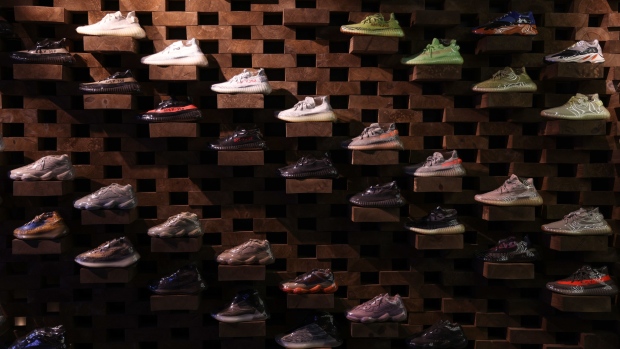Nov 9, 2022
Adidas Cuts Profit Forecast After Terminating Yeezy Partnership
, Bloomberg News

(Bloomberg) -- Adidas AG slashed its profitability forecast for the fourth time this year after ending its partnership with rapper Ye and discontinuing the lucrative Yeezy line of sneakers.
The German company said it now expects an operating margin of 2.5% this year, down from a previous 4% target.
The lower forecast reflects the company’s decision last month to end its collaboration with the rapper and designer formerly known as Kanye West, following a string of offensive and antisemitic remarks. The Yeezy line accounted for about half of Adidas’s total profits, according to analysts.
Bjorn Gulden, the former chief executive officer of rival Puma SE, will take over as CEO in January. The company is seeking to revive its fortunes amid a panoply of challenges, including in China, once Adidas’s biggest growth engine, where sales are down by about a third through September amid consumer boycotts of Western brands.
Read more: Adidas Is a Short Walk for New CEO, But May Prove Hard Climb (1)
The shares were 0.8% lower in early trading, after initially dropping as much as 3.1%. The stock has risen about 27% since Friday, when Adidas announced it was in talks with Gulden about the CEO job.
Adidas’s profit outlook has deteriorated consistently this year. After initially targeting an annual operating margin of as much as 11% in March, the company lowered that to 9.4% in May, 7% in July and 4% last month before today’s latest cut.
The challenges keep coming, from costs associated with pulling out of Russia to dealing with lackluster demand and Covid lockdowns in China to fears of recession in the West.
Premium Sneakers
For years, the Yeezy sneakers have been some of Adidas’s most expensive -- and most sought-after -- products. A pair typically sold for about €230 initially, more than twice the price of longstanding classics like the Superstar kicks. What’s more, Yeezy shoes have often fetched far more than that on the resale market, reinforcing the buzz around the product.
Now, Adidas needs to figure out if it can keep successfully marketing shoes of the Yeezy design -- just stripped of the Yeezy name.
Amid all these problems, Adidas is dealing with a situation where unsold goods are piling up. The company also trimmed its forecast for currency-neutral revenue growth this year to a low-single-digit rate from a mid-single-digit goal.
Adidas is hoping the World Cup soccer tournament, which starts this month, will provide a boost. Traditionally, the event has led to a surge in sales of jerseys and soccer gear -- though the unusual timing of this year’s event and concern over the human rights record of host Qatar has so far limited the excitement.
(Updates with information on Yeezy shoes, other information throughout)
©2022 Bloomberg L.P.


